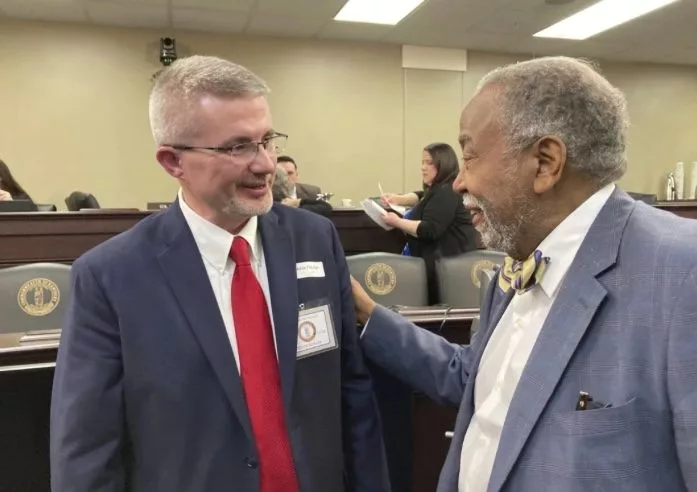
Kentucky’s education commissioner on Tuesday pointed to an estimated $40 million shortfall in funding to school districts and said officials are looking at ways to fill the gap.
Education officials are working with legislative budget committee chairmen and the state budget director on funding options to “minimize impacts” to public schools, Kentucky Education Commissioner Robbie Fletcher said.
His warning comes two weeks before the state’s Republican supermajority legislature reconvenes in February. Lawmakers met for four days early this month, then returned home for the rest of January — the customary schedule for their 30-day sessions in odd-numbered years. Legislators passed a two-year state budget in 2024, but they can reopen the budget to make changes during this year’s session.
Legislative leaders did not immediately respond to emails to their offices Tuesday seeking comment on the projected funding shortfall. It comes as a student-led lawsuit seeks a ruling that the state is failing in its constitutional duty to provide all Kentucky schoolchildren with an adequate and equitable education.
Fletcher on Tuesday pointed to an estimated $12 million shortfall in so-called SEEK funding for Kentucky’s school districts in the current academic year. The Support Education Excellence in Kentucky, or SEEK, program is the state’s main funding formula for public K-12 schools. The formula includes a base per-pupil allocation, as well as additional funding for transportation costs and special-needs students.
“While we know this estimated shortfall is critical to our public schools, it is important to keep in mind that it represents 1.43% of our overall SEEK funding of $2.7 billion,” Fletcher said.
SEEK shortfalls occurred four times in a 14-year period stretching back to the 2010 fiscal year, he said.
On Tuesday, Fletcher also pointed to estimates of “an additional shortfall of $28 million for funding to public school districts that is specifically conditioned on the availability of funds,” he said.
“While we know this estimated shortfall is critical to our public schools, it is important to keep in mind that it represents 1.43% of our overall SEEK funding of $2.7 billion,” Fletcher said.
SEEK shortfalls occurred four times in a 14-year period stretching back to the 2010 fiscal year, he said.
On Tuesday, Fletcher also pointed to estimates of “an additional shortfall of $28 million for funding to public school districts that is specifically conditioned on the availability of funds,” he said.
Fletcher stressed the complexities in developing a two-year state budget for school funding. It involves collecting data to project property values, enrollments and special-needs student populations. The information is sent to lawmakers as they craft the next two-year state budget.
“But these projections are always estimates using the best data available at the time,” the commissioner said. “If estimates are too low, a funding shortage is always a possibility.”
His comments on the projected funding shortfall come as the student-led lawsuit claims the Bluegrass State has been backsliding for years since the state enacted education reforms.
The students, who attend high schools across Kentucky, say they want to hold the state accountable for what they see as its shortcomings in guaranteeing a quality education — regardless of whether a child lives in an affluent or impoverished school district.
Plaintiffs include the Kentucky Student Voice Team, consisting of about 100 students statewide who attend public schools. Some of its members are plaintiffs. Defendants include the top leaders in the Republican-dominated legislature, the state Board of Education and the state education commissioner.
The lawsuit seeks to reopen the case that led to a landmark 1989 Kentucky Supreme Court ruling that the state’s K-12 system was inequitable and inadequate and ordered the legislature to fix it.
The result, a year later, was the Kentucky Education Reform Act, which reshaped the foundations of education, including a new school funding formula the new lawsuit says increased funding for all students and aimed to ensure equity in funding among school districts.
In the past two decades, however, the state has failed to maintain adequate base funding amounts, putting a heavier financial burden on districts, the suit says. The result, it says, is a gap in per-capita spending between the poorest and wealthiest districts that exceeds the disparities deemed unconstitutional a generation ago by the state Supreme Court.
(Photo: Robbie Fletcher, left, chats with Kentucky state Sen. Gerald Neal after Fletcher spoke to a Senate committee on April 12, 2024, in Frankfort, courtesy of the Associated Press)
By Bruce Schreiner, Associated Press








